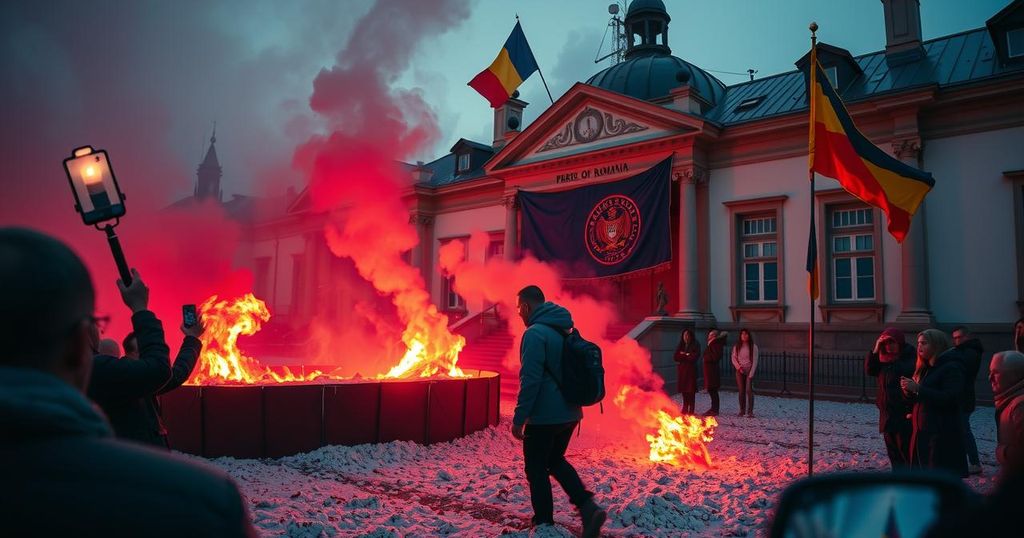Romania’s Political Crisis: The Role of TikTok in Electoral Manipulation

Romania’s first round presidential elections turned contentious when Calin Georgescu, running primarily on TikTok, surged to first place, raising concerns about electoral integrity due to alleged manipulation via bot farms. Investigations revealed cyberattacks and foreign influence, leading to the annulment of election results. The pro-European bloc faced challenges in coalition-building, highlighting deeper democratic vulnerabilities in Romania amidst widespread calls for protests and EU investigations into TikTok’s role.
In late November 2023, Romania experienced a political upheaval following the first round of presidential elections, where independent candidate Calin Georgescu, a far-right politician, unexpectedly garnered nearly 23% of the votes. His campaign was predominantly conducted through TikTok, raising questions about the platform’s algorithm’s role in enhancing his visibility and influence. Observers noted with alarm the surge in support for Georgescu, who has garnered a reputation for pro-Russian sentiments and has expressed intentions to undercut military assistance to Ukraine. The ensuing political crisis prompted investigations revealing possible electoral fraud, including coordinated efforts from TikTok bot farms to bolster his candidacy.
As the political landscape transformed rapidly, protests erupted nationwide, emphasizing concerns regarding the integrity of the election process and the democratic framework. Reports from Romanian intelligence agencies indicated that 25,000 bot accounts were set up to promote Georgescu’s campaign, further complicating the electoral situation. Cyberattacks against election-related websites suggested a concerted effort to undermine trust in the electoral mechanisms, raising alarms about potential Russian interference. Romanian President Klaus Iohannis announced the annulment of the election results, citing substantial violations, which became a catalyst for further civil unrest and political discord.
The cancellation of the election findings instigated a renewed fight for power among Romania’s pro-European political factions, leading to chaotic coalition talks among the Social Democratic Party, the National Liberal Party, and others. Despite securing parliamentary majority, the ongoing crisis stemmed from the inability to elect a new head of state, exacerbated by Iohannis’s constitutionally mandated tenure remaining intact until his successor is appointed. The political turmoil culminated in social media calls for mass protests against the incumbent government, invoking historical parallels to the fall of the Ceausescu regime during Romania’s revolution.
In a significant development, the European Commission has launched investigations into TikTok’s alleged role in the electoral manipulations, with accusations of its negligence in managing political content raised. The allegations suggest that TikTok might have facilitated Russian operatives’ influence on the election, by allowing Georgescu’s profile greater reach without the appropriate political designations. TikTok, for its part, has denied any involvement in orchestrated mischief, claiming no evidence of foul play on its platform.
The Romanian electoral debacle exemplified the vulnerabilities of democratic processes in the face of social media exploitation. As public trust in electoral integrity wanes, pressing challenges remain for European nations in combatting external influences and ensuring fair governance. With Europe grappling with increasing cases of foreign interference in electoral systems, the call for collaborative measures to enhance media literacy, safeguard electoral processes, and impose stricter controls on social media platforms becomes more urgent than ever.
The Romanian presidential elections of late 2023 presented a distinct case study in the intersection of social media influence and electoral integrity. The rise of Calin Georgescu, supported by TikTok, highlights the potential of digital platforms to shape political narratives and manipulate electoral outcomes. Observers viewed this as symptomatic of wider challenges faced by democracies globally in the face of rapidly evolving technologies that facilitate disinformation and political manipulation. The revelations about algorithmically-driven support for candidates raise critical discussions about regulatory measures and the ethical responsibilities of social media networks in democratic settings.
The political turmoil surrounding the Romanian presidential elections underscores the urgent need for strategic safeguards against the exploitation of social media for political gain. With reported instances of cyber manipulation and external interference, it is imperative for governmental bodies and electoral authorities to strengthen regulatory frameworks governing social media usage in political contexts. The failure to address these systemic risks could have far-reaching implications for Romania’s political future and serve as a cautionary tale for other nations grappling with similar challenges of preserving democratic integrity in the digital age.
Original Source: uacrisis.org








